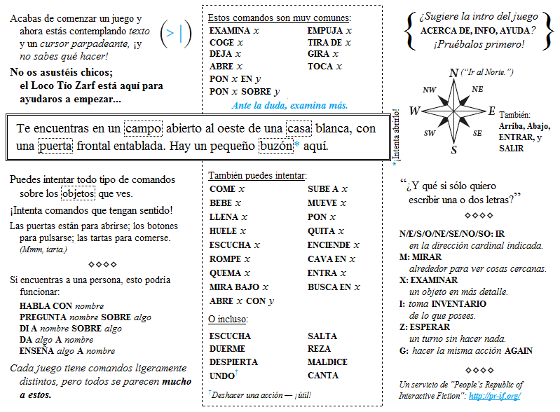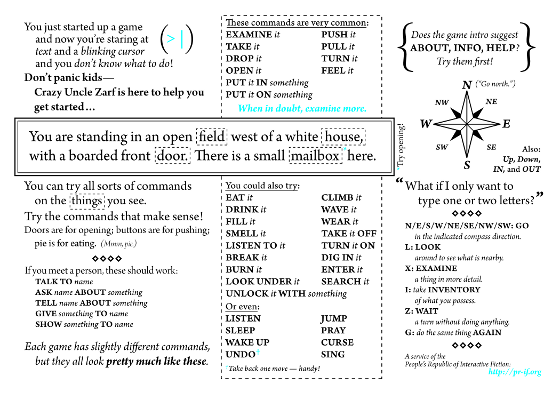
English version of the interview
Todavía recuerdo aquellas tardes junto a mi Spectrum, mientras probaba a avanzar y recoger todos los tesoros en “La Aventura Original“, haciendo mapas y anotaciones de mis descubrimientos. Las aventuras conversacionales -o ficción interactiva, como se conoce en países de habla anglosajona- no tenían gráficos alucinantes, y tampoco requerían grandes reflejos, pero eran terriblemente absorbentes, y han envejecido bastante bien. De hecho, es un género que cuenta actualmente con una gran cantidad de seguidores, y si consultamos la web IF Archive, veremos que se han producido bastantes títulos en los últimos años. Generalmente, las producciones se han publicado de forma gratuita, pero hay gente como Andrew Plotkin que cree que la ficción interactiva puede ser viable comercialmente hoy en día.
Andrew se ha convertido por méritos propios en una figura clave en este peculiar mundillo, ya que ha publicado varios juegos, ha recibido numerosos premios por su trabajo, y también se ha preocupado de que existan nuevos formatos e intérpretes -como Glulx-, para producir aventuras conversacionales modernas. Hace poco, decidió ir más allá, convirtiendo esta afición en su trabajo. Para elló, publicó un proyecto en Kickstarter que consiguió recaudar más de treinta mil dólares.
Quizás este género no esté tan “muerto”, ¿verdad? 
He estado algo desconectado del mundo de las aventuras conversacionales desde hace varios años, cuando dejaron de ser comercialmente viables a principios de los noventa. ¿Cómo resumirías los avances en el género desde entonces?
El cambio más importante se ha producido en las herramientas de desarrollo. Los sistemas de diseño de aventuras conversacionales ahora son portables, bien documentados y completamente gratuitos. Ya dejaron de ser secretos guardados férreamente por pequeñas compañías.
Más allá de esto, creo que ya es una cuestión de gusto personal. En este género actualmente hay obras que no encajan en lo que podría considerarse como “comercialmente viable” en los viejos tiempos. Puedes encontrar juegos realmente largos y otros muy cortos, títulos que experimentan con una idea sencilla, y otros que juegan con la poesía, trucos narrativos, e incluso con matices emocionales.
Una detalle que me ha llamado la atención, es la gran cantidad de lenguajes e intérpretes que se usan hoy en día para crear aventuras, desde la vieja “máquina Z”, hasta implementaciones más actuales, como tu proyecto Glulx. ¿No crees que hace falta una “estandarización”? ¿Es suficiente con tener clientes web que simplifican el acercamiento a este tipo de juegos?
Realmente no existe la necesidad de unificar toda la ficción interactiva en una única plataforma. No se ganaría mucho con eso. Trabajar sobre algo establecido tiene sus ventajas, y lo hacemos bastante bien. Por otro lado, hay mucho trabajo detrás de los sistemas populares que se utilizan hoy en día. No puedes despreciar todo ese esfuerzo y forzar a la gente a portar todo a un único sistema.
Los clientes web son una solución a un problema distinto: convencer a la gente a probar la ficción interactiva. En el mundo actual, eso equivale a los navegadores, y esa es toda su utilidad.
Ahora que hacer aventuras va a ser tu trabajo, ¿no tienes miedo de que se convierta en algo tedioso y aburrido?
Ya ha pasado un mes, y todavía no estoy aburrido. Eso sí, ayuda el hecho de que tenga varios proyectos en paralelo: tareas de diseño, crear el intérprete, así como planear eventos y entrevistas. Puedo alternar entre ellos libremente.
La moda actual en los videojuegos es “no frustrar al usuario”, llevándole de la mano casi desde el principio hasta el final. Sin embargo, jugar a aventuras conversaciones requiere inmersión, tomar notas, e incluso volver a empezar si metes mucho la pata. ¿Crees que esto hace más difícil atraer a nuevos jugadores a este género?
Puede que ese sea un factor.
Sin embargo, no es tan simple. Muchos juegos son complicados, e incluso frustrantes, una vez que te enganchas a ellos. Sólo están haciendo más amigables las introducciones. A los jugadores les gustan los buenos tutoriales.
La ficción interactiva nunca ha sido buena con las introducciones…
En línea con la pregunta anterior, está claro que en las plataformas portátiles de Apple los juegos que más venden son los más simples y casuales, y generalmente están diseñados para jugarse en sesiones cortas. Sin embargo, en “Hadean Lands” el jugador debe enfrente a una interfaz de texto, y seguramente necesitará sesiones más largas para no sentirse perdido en el juego. ¿Vas a ofrecer algún tipo de ayuda en la interfaz para “solucionar” este problema? ¿Quizás el apoyo que has recibido en tu proyecto de Kickstarter demuestra que hay mucha gente que prefiere tener una “aventura clásica” en iOS?
Setecientos seguidores es una buena audiencia, pero no sé qué relación tienen con el número total de fans de la ficción interactiva en iOS. Quizás hay decenas de miles más por ahí… quizás setecientos son todos los que hay.
Pero tengo la intención de ajustar el juego y la interfaz para que funcionen mejor en un terminal móvil. Voy a incorporar un mapa dinámico que puedes tocar para moverte rápidamente por el juego, y también incluiré alguna utilidad para tomar notas. Y como se aprenden nuevos conjuros constantemente, me aseguraré de que sea fácil repetir todo lo aprendido, mostrando una lista con los hechizos que puedas realizar y los ingredientes necesarios para ello.
Creo que en la ficción interactiva ocurre un fenómeno curioso, ya que tanto creadores como jugadores tienen que enfrentarse al “síndrome de la página en blanco”. En el caso de los primeros es obvio, pero cuando alguien se enfrenta a una aventura conversacional por primera vez, tiene tanta libertad que generalmente no sabe por dónde empezar. ¿Crees que es algo que deba arreglarse -o tratarse como lo hiciste con “The Dreamhold”-, o es parte de la gracia de este género?
No saber por dónde empezar no es divertido; siempre es un problema. Un jugador experimentado puede encontrar un escenario que sea muy abierto o sin restricciones, pero siempre tendrá una idea de las acciones que pueden funcionar. En un juego bien diseñado, el hecho de experimentar con las acciones comunes puede producir resultados interesantes, o dar una pista para guiar correctamente al jugador.
Si no tienes ni idea de qué teclear, es diferente. Creo que es algo que tiene que se tratado. Por supuesto, es complicado poner en todos los juegos el tipo de tutorial que hice en “The Dreamhold“. Pero creo que tenemos que hacer ese esfuerzo, al menos en los juegos enfocados a un público más amplio.
 Usar sólo en caso de emergencia
Usar sólo en caso de emergencia 
¿Qué valoras más: un argumento que enganche a los jugadores, o una mecánica de juego que mezcle perfectamente puzles, interacciones, laberintos,…? ¿Quizás un equilibrio entre ambos elementos?
Siempre me encanta ver una buena mecánica de juego, porque es un arte nuevo y complicado en nuestra sociedad. Leo un montón de libros, y algunos de ellos tienen una historia estupenda, así que no tengo una gran necesidad de buena narrativa en los juegos.
Cuando digo “mecánica de juego“, no me refiero sólo a un puzle ingenioso. Me refiero a puzles que se presenten adecuadamente, interacciones que sumerjan al jugador en la aventura, entornos que propicien la imaginación. No puedes separar estas cosas, porque la idea que tiene un jugador de lo que se puede hacer siempre se sustenta sobre la noción que se forjado sobre el mundo del juego.
Salvo alguna que otra excepción, las historias de los juegos comerciales de hoy en día suelen apestar. ¿Crees que hay juegos que no necesitan una historia (acción, puzle,…), o piensas que es un elemento clave en cualquier título?
Lo interesante no es que haya muchos juegos con historias pobres, sino que haya juegos con historia. Los jugadores parece que necesitan una narrativa compleja en cada juego, incluso en los de puzles sencillos o los de reflejos. No creo que sea un elemento necesario, pero creo que no debe ignorarse.
La buena noticia es que los diseñadores se han sacado de la manga muchas formas de solventar este problema, incluso cuando la narrativa no es su fuerte. Algunos juegos tienen una trama muy sencilla y se muestra a pinceladas, pero está bien presentada y encaja con la mecánica de juego, así que funciona bien. Piensa en “World of Goo“, por ejemplo. Algunos juegos tienen historias cursis y ñoñas, pero su encanto suple los diálogos absurdos que tienen.
Y algunas veces, la historia simplemente es pésima, o está mal integrada. Obviamente, a todos nos gustaría en estos casos que las compañías pusiesen más de su parte. Saben que es importante, pero no saben como mejorar este punto.
En tu proyecto de Kickstarter pediste financiación para tu juego, y también para desarrollar herramientas opensource con las que se pudiesen publicar fácilmente nuevas aventuras conversacionales. Viendo el considerable éxito de tu iniciativa… ¿quizás vamos a vivir un renacimiento de la ficción interactiva en smartphones y tablets?
Esa es mi apuesta. Ya estamos viendo más juegos basados en texto que no son propiamente ficción interactiva, y eso es una buena señal. Que el éxito de mi proyecto de Kickstarter sea otra buena señal… quizás es pronto para saberlo.
Probablemente tenderé un intérprete para iPhone funcionando antes de que termine “Hadean Lands“. Intentaré lanzar “The Dreamhold” como juego gratuito, para ver como reacciona el público.

Personalmente, creo que el “ecosistema iPhone” es bastante interesante comercialmente, pero veo varios problemas para jugar apropiadamente a títulos de ficción interactiva, empezando por la entrada de texto, y terminando con la pantalla, que termina provocando fatiga visual. ¿No crees el el Kindle y otros dispositivos de tinta electrónica son mucho más indicados para este tipo de juegos?
De hecho son muy interesantes. Pero no puedo trabajar en todo al mismo tiempo. Cuando empecé este proyecto en octubre del año pasado, el Kindle 3 acababa de salir, y el programa de desarrollo estaba en beta, así que decidí enfocar mis esfuerzos a desarrollar en iOS. Cuando termine el juego, el mundo será distinto: habrá muchos tablets con Android, y se habrán vendido muchos Kindles. Tendré que decidir en qué centrarme.
Gracias por tu tiempo y tus respuestas. ¡Te deseo lo mejor en tus proyectos!
De nada, y gracias a ti por charlar conmigo.
I have been somewhat out of touch from IF for many years, since they ceased to be viable commercially in the early nineties. How would you summarize the progress in this genre since then?
The most important change is in the development tools. IF design systems are now portable, well-documented, and free to use. It’s not proprietary secrets locked up in a few small companies any more.
Beyond that, I think it’s simply a matter of what people are willing to try. IF now takes many, many forms that don’t match what would have been considered commercially viable back in the old days. You can find very long games, very short games, games that experiment with a single idea, games that explore poetry or narrative tricks or emotional shadings.
One thing that caught my eye is the large number of languages and interpreters used today to create IF, from the ancient Z-machine to more modern implementations, such as your Glulx project. Don’t you think that a “standardization” is mandatory? Is it enough to have web clients that simplify the approach to this type of games?
There’s really no pressure to unify all IF into one platform. It wouldn’t gain a lot. It’s good to build on existing work, and we do that well enough. But by the same token, a lot of work has gone into the most popular systems used today. You couldn’t uproot all of that and force people to port everything to a single system.
Web clients are a solution to a different problem — convincing people to try IF. In today’s world, that means web browsers, and that’s all there is to it.
Now that making IF is going to be your job aren’t you afraid of it becoming tedious and boring?
It’s been a month now, and I’m not bored yet. It helps that I have so many IF projects lined up — design work, interpreter work, planning public events, interviews. I can switch from one to another freely.
The current trend in video games is “not to frustrate the user”, taking him by the hand almost from the beginning to the end. However, playing IF requires immersion, taking notes, and even restarting if you mess it up big time. Do you think this makes it harder to attract new users to playing IF?
That’s probably a factor.
It’s not that simple, though. Plenty of videogames are challenging, or even frustrating, once you get into them. It’s really only the introduction that’s become consistently friendlier. Players want good tutorials.
IF has always been bad at introductions.
In line with the previous question, it’s clear that on portable Apple platforms, casual and simple games are the best sellers, and they are usually meant to be played in short sessions. However, with “Hadean Lands” the player must deal with a text interface, and he may need longer sessions in order to not feel “lost” in the game. Are you going to try to offer any kind of help in the interface to “fix” this? Maybe the support you have received in Kickstarter proves that there are many people who prefer to have a “proper” IF game on iOS?
Seven hundred supporters is a good audience, but I don’t know what it means for the total number of IF fans on iOS. Maybe there are tens of thousands of them out there. Maybe seven hundred is all of them.
But I do intend to tune the game, and the interface, to work better in a mobile setting. The game will have a dynamic map that you can tap to move around quickly. I’ll include some kind of in-game note-taking feature. And since most of the gameplay is about learning magical rituals, I’ll make sure it’s easy to scan through your memories and list the spells and ingredients you’ve found.
I think that IF has a curious phenomenon, as both creators and players have to face the “blank page syndrome”. In the case of the former is obvious, but when someone faces an IF game for the first time, has so much freedom that often doesn’t know where to start. Do you think this is something that should be “fixed” -or managed as you did in “The Dreamhold”-, or is it part of the fun?
Not knowing how to get started is never fun; it’s always a problem. An experienced IF player may find a scenario to be wide-open or unconstrained, but he’ll have an idea what kinds of actions might work. And in a well-designed game, experimenting with the most common IF actions will either produce interesting results, or point the player towards better ideas.
If you don’t know what to type at all, that’s different. I think it does have to be managed. Of course, it’s difficult to set up every game with the kind of tutorial I put in “The Dreamhold“. But I think we have to make that effort, at least for games aimed at a wide audience.
 Emergency use only
Emergency use only 
What do you value the most: an argument that really engages and immerses players, or gameplay that blends perfectly puzzles, interactions, labyrinths and so on? Perhaps a balance between these two elements?
I’m always excited to see good gameplay, because gameplay is a newer and more difficult art in our society. I read a lot of books, and some of them have very good stories. I’m not starved for good storytelling.
When I say “gameplay“, I don’t just mean a clever puzzle. I mean puzzles that are presented well, interactions that pull the player into the world, environments that catch the imagination. You can’t separate these things, because the player’s idea of what he can do is always built on his notion of the game world.
A few exceptions appart, stories in current commercial games usually suck. Do you think there are titles that doesn’t need a good story (action, puzzle,…), or do you believe that it’s a key element in any game?
The interesting point is not that so many games have weak stories, but that so many games have stories at all. Players seem to want narrative frameworks in every game they play, even simple puzzle or reflex games. I don’t think it’s a necessary element, but you shouldn’t ignore it.
The good news is that game designers have come up with a great many ways to approach that element — even though most designers aren’t experienced writers. Some games have very light touches of narrative, but they’re well-presented and fit the gameplay, so they work well. Think of “World of Goo“, for example. Some games have cheesy, overwrought stories, but their enthusiasm makes up for the awkward dialogue.
And sometimes the story is just bad, or badly integrated. Obviously we all wish that design studios would put more effort into their storytelling, in those cases. They know it’s important, but they don’t know how to improve it.
In your Kickstarter project, you were asking money not only for your game, but also to develop opensource tools so people could easily publish new IF games. Seeing the considerable success of your initiative… maybe are we going to see a rebirth of IF in smartphones and tablets?
That’s my gamble. We’re already seeing more text-based games that aren’t full-parser IF. That’s a good sign. Whether my Kickstarter support is another good sign… as I said, it’s hard to judge yet.
I’ll probably have a working iPhone interpreter before “Hadean Lands” is finished. I’ll try releasing “The Dreamhold” as a free game, and see how people react to that.

Personally, I think the “iPhone ecosystem” is quite interesting commercially, but I find many problems in order to play IF titles properly, starting with how you enter the text, and ending with the screen, because it eventually causes eye strain. Don’t you think that Kindle and other e-ink devices are much more interesting to playing IF games?
They’re interesting, certainly. But I can’t work on everything at the same time. When I set this project up (October of last year) the Kindle 3 was just barely out; Kindle’s development program is still in beta. I decided to focus on iOS first. By the time I finish my game, the world will be different — there will be plenty of Android tablets as well as Kindles in the world. I’ll have to decide then what to tackle.
Thanks for your time and your answers. I wish you the very best in your projects!
You’re welcome, and thank you for talking to me.
